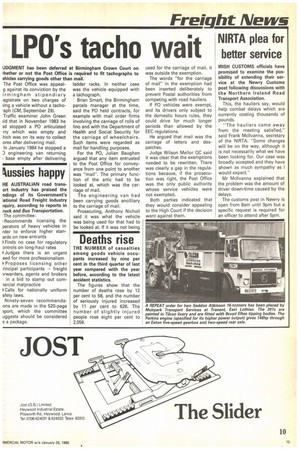UDGMENT has been deferred at Birmingham Crown Court on rhether
Page 17

If you've noticed an error in this article please click here to report it so we can fix it.
or not the Post Office is required to fit tachographs to ehicles carrying goods other than mail.
The Post Office was appealg against its conviction by the irmingham stipendiary agistrate on two charges of sing a vehicle without a tacho'aph (CM, September 29).
Traffic examiner John Green lid that in November 1983 he )d stopped a PO articulated rry which was empty and hich was on its way to collect ores after delivering mail.
In January 1984 he stopped a engineering van returning base empty after delivering ladder racks. In neither case was the vehicle equipped with a tachograph.
Brian Smart, the Birmingham parcels manager at the time, said the PO held contracts, for example with mail order firms involving the carriage of rolls of lino and with the Department of Health and Social Security for the carriage of wheelchairs. Such items were regarded as mail for handling purposes.
For the PO, Julian Baughan argued that any item entrusted to the Post Office for conveyance from one point to another was "mail". The primary function of the artic had to be looked at, which was the carriage of mail.
The engineering van had been carrying goods ancilliary to the carriage of mail.
Prosecuting, Anthony Nicholl said it was what the vehicle was being used for that had to be looked at. If it was not being used for the carriage of mail, it was outside the exemption.
The words "for the carriage of mail" in the exemption had been inserted deliberately to prevent Postal authorities from competing with road hauliers.
If PO vehicles were exempt, and its drivers only subject to the domestic hours rules, they could drive for much longer periods than allowed by the EEC regulations.
He argued that mail was the carriage of letters and despatches.
Judge Wilson Mellor QC said it was clear that the exemptions needed to be rewritten. There was clearly a gap in the regulations because, if the prosecution was right, the Post Office was the only public authority whose service vehicles were not exempted.
Both parties indicated that they would consider appealing to the High Court if the decision went against them.








































































































